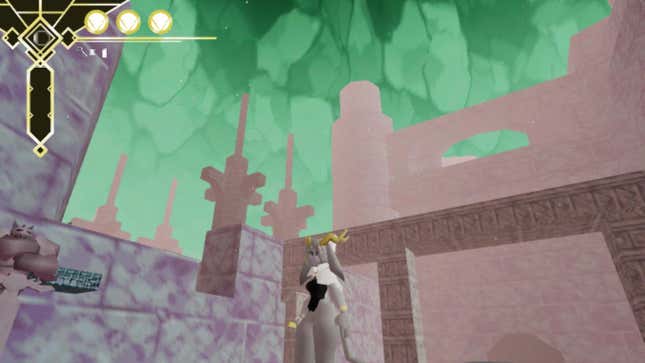
Every Friday, A.V. Club staffers kick off our weekly open thread for the discussion of gaming plans and recent gaming glories, but of course, the real action is down in the comments, where we invite you to answer our eternal question: What Are You Playing This Weekend?
There’s a tweet that kicks around on the more games-focused bits of the internet every once in a while, dating all the way back to the ancient, positively hoary days of mid-2020: Written by Jordan Mallory, it declares, simply, “I want shorter games with worse graphics made by people who are paid more to work less and I’m not kidding.”
As far as statements go, it’s hard to fault: The games industry is absolutely notorious for chewing up developers en masse, and the increasing graphical horsepower “demanded” by modern gaming is a big part of that crunch and churn. We all like to “ooh” and “ahh” at a massive world or an expansive “technical marvel,” but we also know, deep down, that it’s typically being powered by the blood, sweat, and tears of hundreds of people—only some of whom probably even made it to the end of the project to get their names on the finished product. And from a strictly player-focused point of view, gaming’s endless obsession with delivering the biggest, longest, most detailed worlds imaginable can often feel, frankly, exhausting. (If you’ve never opened up the map in a Far Cry game, or something of its ilk, and felt a sudden rush of despair of how much is there, you’re a less tired person than me.)
It’s in that spirit that I’m contemplating Pseudoregalia this week, a 3D platformer that crept up from the depths of the indie game dev scene over on online marketplace itch.io to absolutely colonize my brain. Looking like the coolest game to never appear on the Sega Saturn or Sony PlayStation, Pseudoregalia feels like it captures a big part of what Mallory was driving at with their tweet. (I’m pretty sure the game’s sole developer, known online as rittzler, worked considerable hours to put this thing together, though.) It’s a huge reminder that “graphics” matter much less, in the long run, than having a well-defined aesthetic; that “length” is only a selling point when you’re not trying to deliver more than your core game idea can actually support; and that, in a medium that lives and dies in the hands, having satisfying gameplay can overcome almost any other issues.
You’ll notice almost immediately that Pseudoregalia is aggressively light on plot; you play as a rabbit-goat woman named Sybil who finds herself, when the game starts, trapped in a very blocky and polygonal dungeon that we’re told is located somewhere in the realm of dreams. Literally from the jump, though, you’ll start to encounter the game’s biggest selling point: A fluid and ever-expanding approach to traversal and movement that only builds as Sybil finds more power-ups across the game’s small, but exceptionally action-rich world. It’s the sort of game where a massive gap between two platforms isn’t an immutable obstacle, but the start of a series of pleasant mental calculations: “If I slide-jump from there, hit that bubble, boost off it to there… I can just about make this sucker.” Featuring light but serviceable combat, the game puts its primary focus on the joy of moving, sliding, leaping, and more. It knows the secret of a great 3D platformer: Bodies in space don’t have to look great—they just have to move great.
It’s also admittedly—and for many of the reasons outlined above—a hard game to sell via screenshots. So if your curiosity is piqued, do yourself a favor and check out the above trailer to see the movement in action. (And, yes, in case you were concerned: There’s a very welcome option to give the poor woman some pants.) The game is currently available on Steam, where it’s garnered a massive number of “Overwhelmingly Positive” reviews in its scant three weeks of availability, and where you can pick it up for a song. If you’re up for a night or two of incredibly solid and inventive running, jumping, and thwacking stuff—and you don’t mind a lack of a map to smooth out some of the rougher edges of exploration—then it’s a hard game not to recommend.